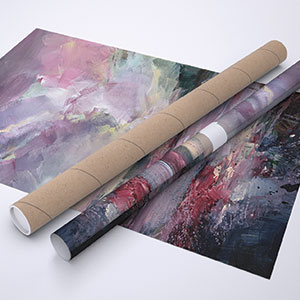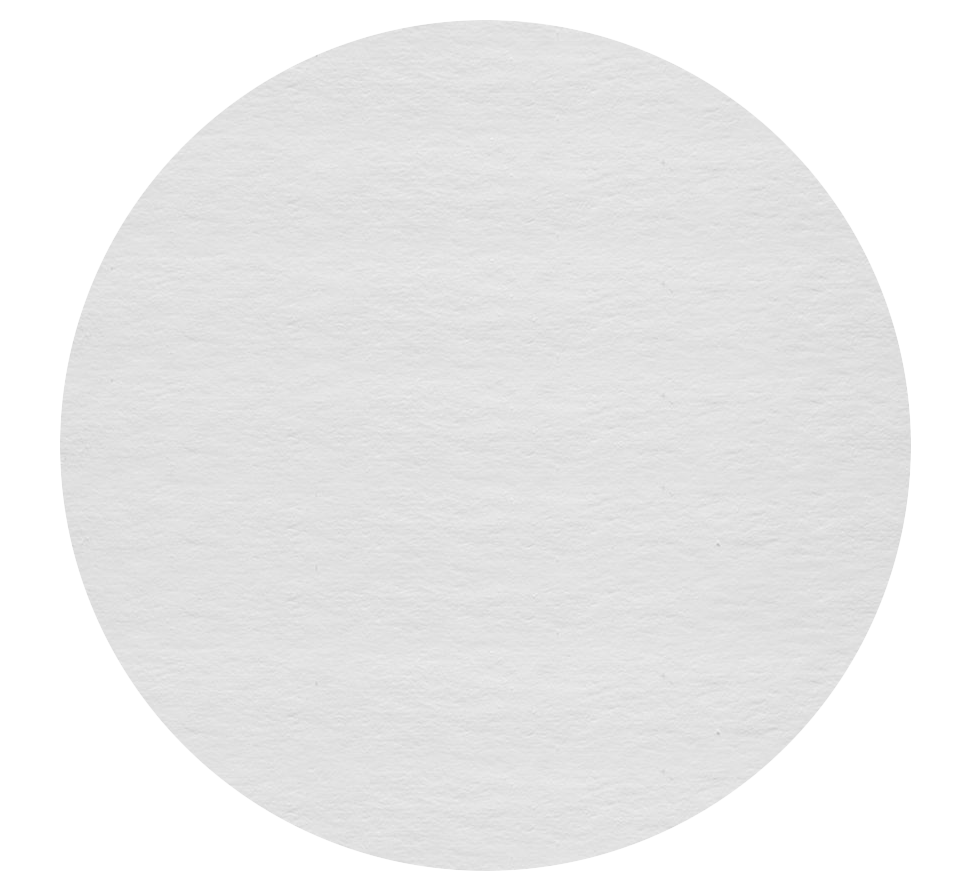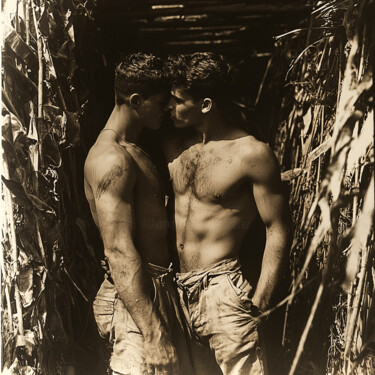










lgbt artworks photos gay vintage fashion pride photo queer (2024) Arte digital por Raphael Perez
Impresiones "Fine-Arts" en papel
Es un proceso de impresión en papel de arte usando tintas pigmentadas de muy alta calidad e impreso en muy alta definición. Su nivel de conservación es excepcional (más de 100 años), su calidad, profundidad y riqueza de matices supera la clásica impresión fotográfica en papel argentino.

Acabado brillante
Además de su grosor excepcional, el papel de fibra está compuesto de una base de alfa-celulosa sin ácido y está cubierto con sulfato de bario y una capa microporosa que mejora la absorción de pigmentos durante la impresión. Con un color blanco puro, no amarillento a claro, este papel está especialmente diseñado para resistir y envejecer. Es utilizado por los principales museos de todo el mundo, ya que ofrece una resolución excelente, y ofrece colores profundos y densos.
Obra de arte "Fine Art" - Acabado brillante sobre papel base de fibra 325 g.

Nuestras impresiones y reproducciones de gama alta
ArtMajeur solo utiliza papeles naturales con pH neutro, resistentes y de alta calidad, seleccionados de fabricantes de papel de renombre
Nuestra impresora maestra presta atención constante, ya sea en términos de control de color o respeto por la cadena gráfica. Nuestro alto nivel de exigencia de calidad es un activo importante de las impresiones artísticas enmarcadas de ArtMajeur.
Para los artistas! Usted ayuda a los artistas a vivir de su trabajo. Reciben el pago de sus derechos cada vez que usted compra sus impresiones.
Acerca de nuestras impresionesCompre una licencia para utilizar esta imagen en su sitio web, su comunicación o para vender productos derivados.
Usage: Licencia web
| 1500 px | ||

|
1500 px |
| Dimensiones del archivo (px) | 1500x1500 |
| Uso en todo el mundo | Sí |
| Uso en multi-soporte | Sí |
| Uso en cualquier tipo de medio | Sí |
| Derecho de revender | No |
| Número máximo de impresiones | 0 (Zero) |
| Productos destinados a la venta | No |
Descargar inmediatamente después de la compra
Esta imagen está disponible para descargar con una licencia: puedes descargarlos en cualquier momento.
Restricciones
Todas las imágenes de ArtMajeur son obras de arte originales creadas por artistas, todos los derechos están estrictamente reservados. La adquisición de una licencia da derecho a usar o explotar la imagen bajo los términos de la licencia. Es posible realizar modificaciones menores tales como reenfocar o reenfocar la imagen para que se ajuste perfectamente a un proyecto, sin embargo, está prohibido realizar cualquier modificación que pudiera dañar la obra original. En su integridad (modificación de formas, Distorsiones, corte, cambio de colores, adición de elementos, etc ...), a menos que se obtenga previamente una autorización por escrito del artista.
Licencias personalizadas
Si su uso no está cubierto por nuestras licencias estándar, póngase en contacto con nosotros para obtener una licencia personalizada.
Banco de imágenes de arte-
Este trabajo es una "edición abierta"
Arte digital,
Impresión Giclée / Impresión digital
- Dimensiones Varios tamaños disponibles
- Varios apoyos disponibles (Papel de bellas artes, Impresión sobre metal, Impresión sobre lienzo)
- Enmarcado Enmarcado disponible (Marco flotante + bajo vidrio, Marco + bajo vidrio acrílico)
- Estado de la obra de arte la obra esta en muy buen estado
- Imagen generada por IA El artista creó esta imagen utilizando tecnología de inteligencia artificial.
- Categorías Figurativo Amor
===================================
Writing a 5,000-word article on vintage gay photos is a fascinating endeavor. These photos capture the essence of LGBTQ+ history, showcasing moments of love, defiance, and everyday life. Let's start with a comprehensive overview, and if you need more details or specific sections expanded, we can build on this foundation.
Vintage Gay Photos: A Glimpse into LGBTQ+ History
Introduction
Vintage gay photos offer a unique window into the past, revealing the lives and experiences of LGBTQ+ individuals in different eras. These images, often taken in secret or in safe spaces, document the resilience, joy, and struggles of a community that has long fought for recognition and rights. This article explores the significance of these photos, the stories they tell, and their impact on contemporary LGBTQ+ culture.
The Early 20th Century: Hidden Lives and Secret Love
In the early 1900s, being openly gay was fraught with danger. Despite this, many individuals found ways to express their love and identity through photography. These images often depict couples in intimate poses, friends enjoying each other's company, and individuals proudly displaying their true selves.
Key Figures:
Baron Wilhelm von Gloeden: A German photographer known for his homoerotic images of young men in classical poses, taken in Sicily.
Alice Austen: An American photographer who captured candid moments of her life with her partner, Gertrude Tate, and their circle of friends.
The 1920s-30s: The Jazz Age and the Rise of Queer Culture
The 1920s and 1930s saw a burgeoning of queer culture, particularly in urban centers like New York, Berlin, and Paris. Speakeasies, drag balls, and cabarets became safe havens for LGBTQ+ individuals to express themselves freely. Photographs from this era often show glamorous drag performers, same-sex couples dancing, and vibrant nightlife scenes.
Cultural Milestones:
The Harlem Renaissance, which included prominent LGBTQ+ figures like Langston Hughes and Bessie Smith.
The rise of drag culture, with performers like Julian Eltinge and Gladys Bentley gaining popularity.
The 1940s-50s: War, Repression, and Resilience
World War II and the post-war era brought both challenges and opportunities for the LGBTQ+ community. Many gay men and women served in the military, forming close bonds and finding acceptance among their peers. However, the 1950s also saw increased repression, with the Lavender Scare targeting LGBTQ+ individuals in government positions.
Key Figures:
J. C. Leyendecker: An influential illustrator whose work often featured homoerotic undertones.
Tom of Finland: A Finnish artist whose drawings of hyper-masculine men became iconic in gay culture.
The 1960s-70s: Liberation and Visibility
The 1960s and 1970s were transformative decades for the LGBTQ+ rights movement. The Stonewall Riots of 1969 marked a turning point, leading to increased activism and visibility. Photographs from this era capture the energy and determination of the movement, with images of protests, Pride marches, and community gatherings.
Cultural Milestones:
The formation of the Gay Liberation Front and the first Pride marches.
The rise of LGBTQ+ publications like "The Advocate" and "Gay Sunshine."
The 1980s: Crisis and Community
The 1980s were marked by the HIV/AIDS epidemic, which had a devastating impact on the LGBTQ+ community. Despite the immense loss, this period also saw a surge in activism and solidarity. Photographs from this era often depict protests, memorials, and the everyday lives of those affected by the crisis.
Key Figures:
Robert Mapplethorpe: A photographer known for his provocative and often controversial images of gay men.
Nan Goldin: An artist whose work documented the lives of her friends and the impact of the AIDS crisis.
Conclusion: The Legacy of Vintage Gay Photos
Vintage gay photos are more than just historical artifacts; they are powerful reminders of the resilience and creativity of the LGBTQ+ community. These images continue to inspire and educate, highlighting the importance of visibility and representation. By preserving and celebrating these photos, we honor the legacy of those who came before us and pave the way for future generations.
===============
raphael perez gay AI vintage fashion pride photo queer photography
lgbt artworks photos gay vintage fashion pride photo queer photography
homosexual pictures lgbt gay vintage fashion pride photo queer photography
old Antiques photos gay vintage fashion pride photo queer photography
pretty young men gay vintage fashion pride photo queer photography
Temas relacionados
Raphael Pérez, también conocido por el nombre hebreo Rafi Peretz, nació en una familia tradicional y se crió en Jerusalén. Su padre, Shimon Perez, trabajaba como recepcionista en el Hospital Hadassah Ein Kerem en Jerusalén, mientras que su madre, Alice Aliza Perez, trabajaba como asistente en una guardería y luego cuidó a un bebé en casa. Raphael tiene varios hermanos, cada uno de los cuales sigue diferentes caminos en la vida, desde la educación hasta la espiritualidad y los viajes.
Después de servir en el Cuerpo de Artillería del Ejército Israelí, Raphael dedicó 15 años a la educación en entornos terapéuticos para niños, enseñando arte y movimiento. Se graduó en el Centro de Artes Visuales de Be'er Sheva, donde estudió de 1989 a 1992. Desde 1999 se gana la vida con la venta de sus obras de arte y trabaja en su estudio de Tel Aviv desde 1995.
A lo largo de los años, Raphael ha explorado varios temas en su arte, en particular las relaciones interpersonales. Su primer trabajo se centró en las relaciones entre hombres y mujeres, antes de aceptar abiertamente su homosexualidad a la edad de 32 años. Desde entonces, ha creado pinturas idealistas que representan relaciones entre personas del mismo sexo en un ambiente doméstico, representando escenas de la vida cotidiana con ternura y afecto.
Además de su trabajo artístico, Raphael también llevó diarios durante muchos años, documentando sus pensamientos, experiencias y luchas personales. Estos diarios se han expuesto en exposiciones individuales y colectivas, proporcionando una visión profunda de su trayectoria personal y artística.
-
Nacionalidad:
ISRAEL

- Fecha de nacimiento : 1965
- Dominios artísticos:
- Grupos: Artistas Israelíes Contemporáneos



























